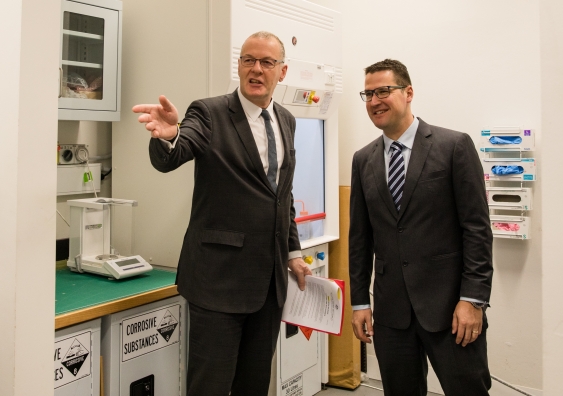UNSW researchers receive $3m to develop first ecofriendly fire retardants
The Assistant Minister for Science, Jobs and Innovation, Zed Seselja, announced the grant on Thursday during a visit to UNSW Sydney.
The Assistant Minister for Science, Jobs and Innovation, Zed Seselja, announced the grant on Thursday during a visit to UNSW Sydney.

Researchers from UNSW Sydney, in partnership with Flame Security International, have received a $3 million Commonwealth grant to develop the industry’s first eco-friendly, non-toxic and durable flame retardant for use in furniture, clothing, cars and construction materials.
Assistant Minister for Science, Jobs and Innovation Zed Seselja announced the Cooperative Research Centres-Projects (CRC-P) Program grant during an event today in the UNSW School of Mechanical and Manufacturing Engineering. In addition to the Commonwealth funding, the project has attracted almost $8m in cash and in-kind contributions from industry and University stakeholders.
The three-year project addresses a need for non-toxic and eco-friendly flame retardant chemicals to protect synthetic materials and fabrics in furniture and clothing, as well external materials such as solar panels and building walls. Many components are highly flammable, presenting a daily threat to human life, property and the environment in a world where polymer and synthetic textile production continues to grow. In addition, the project will work toward manufacturing lightweight fire resistant protective garments in Australia, potentially for global exports.
“It is very exciting, and I am really looking forward to seeing over the next couple of years what comes from the [CRC-P grant],” said Mr Seselja. “I am really pleased that we can invest with you to develop safer materials that are not only fire retardant but also much better for public health and for the environment.”
The CRC-P Program is an Australian federal government initiative to support collaborations between industry, researchers and the community. It is a proven model for linking researchers with industry to focus on research and development for practical use and commercialisation.
“The goal of these instruments created by the government is to interact with industry in a meaningful way to take fast, first-mover advantage in a really important field,” said Brian Boyle, UNSW Deputy Vice-Chancellor for Enterprise.
Professor Boyle added: “The CRC-Ps, which allow Australia to be nimble and take advantage of the gaps in the market place, are just wonderful. And further, the drive this government has had toward enhancing the industry-engagement piece is focusing us even closer with industry.”